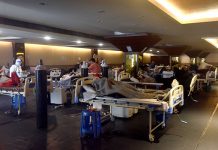I am writing this article in anger and sadness and on behalf of those poor people and daily wage earners who don’t have the means and educational backgrounds that can enable them to write and share their anguish and experiences with the larger public and also with policymakers.
Recently based on my limited travels in DTC buses in North-West Delhi I have observed and experienced a few changes owing to the COVID-19 restrictions implemented by the DTC. The most important restriction is that bus drivers and conductors are now allowed only to travel with passengers in accordance with the total number of seats available on the bus. This means that only passengers equivalent to the number of seats in the bus are permitted inside and no passenger can go standing. To ensure this and to avoid forceful entry of people a police constable is also present in the buses.
On the first impression, it looks this restriction is necessary to keep the spread of COVID-19 at its minimum but when it comes to ground-level experiences and implementation of these actions the situation can be different.
Considering the huge population of Delhi, especially economically poor and socially disadvantaged people who are dependent on public transport for their daily commute, it is creating a huge problem. In the areas that I have travelled to recently, I could see the group of people largely from lower economic backgrounds and disadvantaged identities standing on the bus stand and hoping that in the next bus they will get a seat. Whenever a bus arrives at the bus stand, a group of people starts running towards it and mostly the younger ones push other people around and board the bus. If by any chance any ‘extra individual’ enters the bus then the bus driver, conductor and the policeman start scolding him/her in various ways and force him to get off the bus.
Now keeping the above situation in mind and imagine an old woman or an individual with special needs trying to take the bus, then it’s almost impossible for them to have any chance of getting on the bus especially during office hours. There is no provision, at least I could not see any while travelling in these buses that allows women, people in their old age, people with special needs to board the buses without the hassle and with extra care that may ensure their inclusivity in the public transport machinery of the city.
Considering the fact that the DTC is spending a huge amount of money by keeping one police constable on each bus they can also do a review of these restrictions and then try to ensure that it does not become exclusionary. For the short-term, there should be some special provisions to allow women, old people and people with special needs to board buses without any hassle, for example, the front door of the buses can be only reserved for these groups and the back door can be reserved for other sections of the population. Next, considering the huge dependence of poor people on these DTC buses, maybe more buses can be put in place till these restrictions are in place or increasing the number of people who can board the buses but still maintain the physical distancing in the buses for example keeping specific places circled in the bus where people can stand and travel.
I would like to conclude the article by saying that it has been written not to criticize the DTC or any department but composed with a responsibility that I owe to my fellow countrymen as a citizen and to help the authorities update the rules and regulations based on people’s experiences.
Deendyal Singh is currently working as Project Manager in Youth for Education program of Delhi government.














